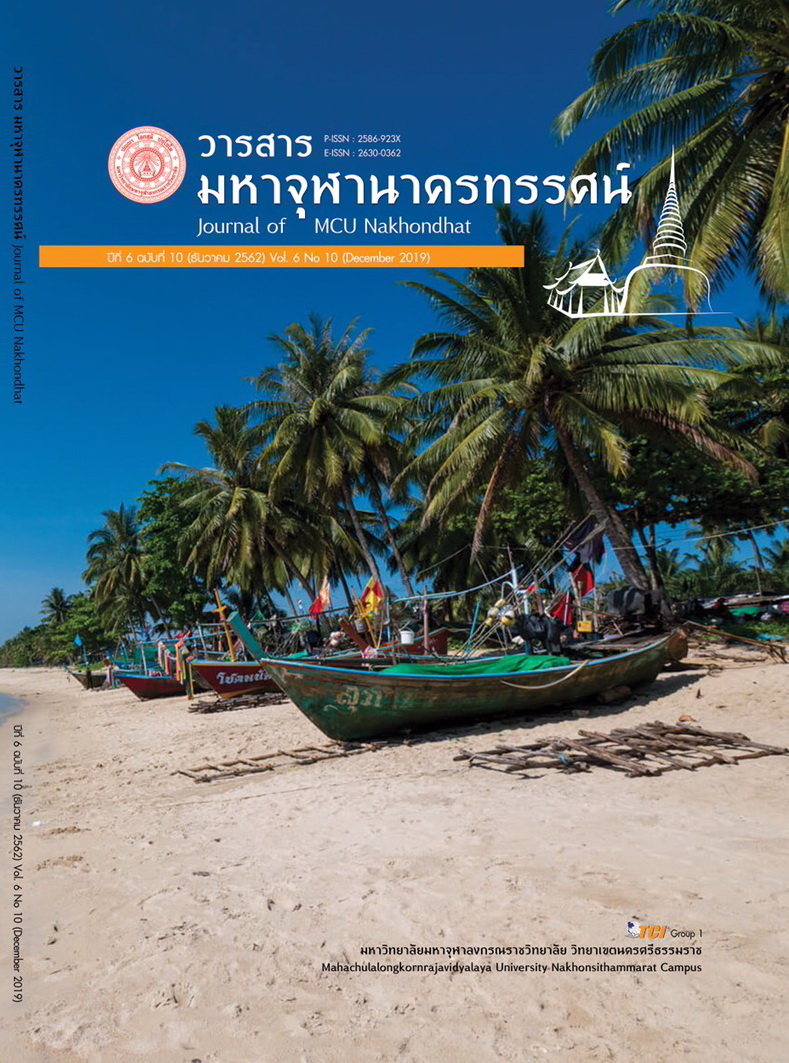AN ENHANCING THE QUALITY OF LIFE OF THE ELDERLY WITH BUDDHIST INTEGRATION
Main Article Content
Abstract
This dissertation is of three objectives as: 1) to study the problems and requirements regarding the elderly’s life quality in the Lampang Luang Sub district Municipality, Ko Kha District Lampang Province, 2) to study the form of activities to enhance the elderly’s life quality in the Lampang Luang Sub district Municipality, Ko Kha District Lampang Province and 3) to enhance the elderly’s life quality based on the Buddhist integration in the Lampang Luang Sub district Municipality, Ko Kha District Lampang Province This research is Quantitative Research and Qualitative Research by using questionnaires with 332 elderly people, collecting 322 people, representing 96.99% and interviewing. The focus group discussion was conducted with 58 older persons using quantitative data analysis, frequency, percentage, mean, standard deviation and descriptive analysis.
The results revealed that:
the problems and requirements regarding the elderly’s life quality in the Lampang Luang Sub district Municipality, in general, it is shown at a low level ( = 2.44) and they required having their quality of life at a high level (
= 3.92). The data collected from interviews on the problems and requirements regarding the elderly’s life quality were divided into 4 aspects: 1) cultural needs, 2) public health needs, 3) economic needs and 4) social needs. Regarding the form of activities to enhance the elderly’s life quality in the Lampang Luang Sub district Municipality, it was found 4 activities viz. 1) cultural activities to enhance the quality of life based on the conservation of religious tradition and the transmission of local culture, 2) activities to enhance the quality of life in public health based on activities to educate about exercising with loincloth for elderly health and others activities entitled ‘Walking Happily’, ’Aging Happily’, the Triple E or Eating, Exercise, Emotional Control and Create Self-sufficient Happiness for the elderly, 3) activities to promote quality of life on economic, those activities involved with the establishment of a group of wood products, Housewife Community Group, The OTOP Center for ICT., activities to promote and develop the elderly from burdens to power under its slogan ‘Aging Valuable with Sustainable Self-Reliance’ and 4) activities to enhance the quality of life in society by establishing the school for elderly under the name of ‘Cha Lor Wai Jai Mee Sukh’ or the School of Anti-Aging with Happy Heart in Lampang Luang District. It was found 4 Buddhist doctrines on enhancing the elderly’s quality of life based the Buddhist integration. Firstly, the Four Sublime States of Mind or Brahmavihàra were practiced in enhancing the elderly’s quality of life on the cultural aspects. Secondly, the âyussa-dhamma or things conducive to long life were practiced in the public health of the elderly. Thirdly, the Iddhipàda or paths of accomplishment were practiced in enhancing the quality of life and economy and lastly, the Saïgahavatthu or virtues making for group integration and leadership were practiced in enhancing the quality of life in society.
Article Details
References
ขันแก้ว ฟูจา. (15 ธันวาคม 2561). การเสริมสร้างคุณภาพชีวิตของผู้สูงอายุเชิงพุทธบูรณาการ. (อดุลย์ กันธิดา, ผู้สัมภาษณ์)
ตุ๋ย แปงจิตต์. (14 ธันวาคม 2561). การเสริมสร้างคุณภาพชีวิตของผู้สูงอายุเชิงพุทธบูรณาการ. (อดุลย์ กันธิดา, ผู้สัมภาษณ์)
นพกุล เครือประเสริฐ. (14 ธันวาคม 2561). การเสริมสร้างคุณภาพชีวิตของผู้สูงอายุเชิงพุทธบูรณาการ. (อดุลย์ กันธิดา, ผู้สัมภาษณ์)
นาค จุ่งมิตร. (15 ธันวาคม 2561). การเสริมสร้างคุณภาพชีวิตของผู้สูงอายุเชิงพุทธบูรณาการ. (อดุลย์ กันธิดา, ผู้สัมภาษณ์)
เนตร กันทา. (14 ธันวาคม 2561). การเสริมสร้างคุณภาพชีวิตของผู้สูงอายุเชิงพุทธบูรณาการ. (อดุลย์ กันธิดา, ผู้สัมภาษณ์)
บรรจบ ปัญญาเลย. (16 ธันวาคม 2561). การเสริมสร้างคุณภาพชีวิตของผู้สูงอายุเชิงพุทธบูรณาการ. (อดุลย์ กันธิดา, ผู้สัมภาษณ์)
บุญศรี นิสิตศิริ. (15 ธันวาคม 2561). การเสริมสร้างคุณภาพชีวิตของผู้สูงอายุเชิงพุทธบูรณาการ. (อดุลย์ กันธิดา, ผู้สัมภาษณ์)
ปราโมทย์ ประสาทกุล. (2560). สถานการณ์ผู้สูงอายุไทย พ.ศ. 2559. กรุงเทพมหานคร: บริษัท พริ้นเทอรี่ จำกัด 999.
เปลี่ยน อินต๊ะสอน. (14 ธันวาคม 2561). การเสริมสร้างคุณภาพชีวิตของผู้สูงอายุเชิงพุทธบูรณาการ. (อดุลย์ กันธิดา, ผู้สัมภาษณ์)
มาลี ขันทะเสมา. (15 ธันวาคม 2561). การเสริมสร้างคุณภาพชีวิตของผู้สูงอายุเชิงพุทธบูรณาการ. (อดุลย์ กันธิดา, ผู้สัมภาษณ์)
ราชบัณฑิตยสถาน. (2546). พจนานุกรมฉบับราชบัณฑิตยสถาน พ.ศ.2542. กรุงเทพมหานคร: นานมีบุ๊คส์พับลิเคชั่นส์.
วรวุฒิ ตุงใย. (16 ธันวาคม 2561). การเสริมสร้างคุณภาพชีวิตของผู้สูงอายุเชิงพุทธบูรณาการ. (อดุลย์ กันธิดา, ผู้สัมภาษณ์)
สมนึก ยะติน. (14 ธันวาคม 2561). การเสริมสร้างคุณภาพชีวิตของผู้สูงอายุเชิงพุทธบูรณาการ. (อดุลย์ กันธิดา, ผู้สัมภาษณ์)
สำนักงานสถิติแห่งชาติ. (2557). กระทรวงเทคโนโลยีสารสนเทศและการสื่อสาร. รายงานการสำรวจผู้สูงอายุในประเทศไทย พ.ศ.2557. กรุงเทพมหานคร: บริษัท เท็กซ์ แอนด์ เจอร์นัล พับลิเคชั่น จำกัด.
สำนักส่งเสริมและพัฒนาสุขภาพจิต กรมสุขภาพจิต. (2560). แนวทางการดำเนินงานส่งเสริมสุขภาพจิตและป้องกันปัญหาสุขภาพจิตในผู้สูงอายุสำหรับโรงพยาบาลชุมชน และโรงพยาบาลส่งเสริมสุขภาพระดับตำบล. กรุงเทพมหานคร: โรงพิมพ์สำนักงานพระพุทธศาสนาแห่งชาติ.
สุภัทร สำเรียงอินทร์. (15 ธันวาคม 2561). การเสริมสร้างคุณภาพชีวิตของผู้สูงอายุเชิงพุทธบูรณาการ. (อดุลย์ กันธิดา, ผู้สัมภาษณ์)
อาชัญญา รัตนอุบล และณะ. (2552). การศึกษาสภาพ ปัญหา ความต้องการ และรูปแบบการจัดกิจกรรมการศึกษานอกระบบ และการศึกษาตามอัธยาศัย เพื่อส่งเสริมการเรียนรู้ด้านการเตรียมความพร้อมเมื่อเข้าสู่วัยผู้สูงอายุของผู้ใหญ่วัยแรงงาน. ใน รายงานวิจัย. สำนักงานกองทุนสนับสนุนการสร้างเสริมสุขภาพ (สสส.).
The WHO Group. (1995). The World Health Organization quality of life assessment (WHOQOL): Position paper from the World Health Organization. Social Science and Medicine, 41(10), 1403-1409.


